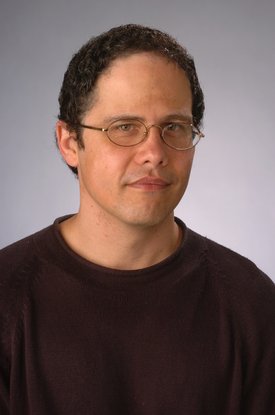
Anthony Garza
- Biology
Research Interests
Biofilm formation, stress resistance in bacteria, bacterial natural products.
Research Program Overview
Bacterial biofilms are highly organized, surface-associated clusters of cells that are up to a 1000-fold more resistant to traditional antibiotics than free-living bacteria. They are the major cause of persistent infections in humans, they clog industrial machinery and they contaminate our water supplies. My lab studies the genetics behind biofilm formation in the non-pathogenic bacterium M. xanthus and in P. aeruginosa, a bacterium that can cause deadly infections in people who have cystic fibrosis, who are immune compromised and who have severe burns. We study several aspects of biofilm formation, including cell-cell signaling, gene regulation, surface motility and stress tolerance.
Undergraduate Research Opportunities
In most natural environments, bacteria live in large, highly organized communities of cells known as biofilms. Biofilms have been linked to human infections, contamination of aquatic environments, and economic losses in industrial settings, leading to a surge in biofilm research over the past decade. Although work on biofilms is still in its infancy, research on the model organism Myxococcusxanthus has been extremely useful in revealing some of the intricacies of life within a biofilm. The success of research on this organism can be attributed to the fact that it is easily grown in a laboratory setting, it has multicellular developmental cycle that is rapid and well characterized, and it is amenable to genetic and molecular analyses. In my research group, we use the biofilm formed by M. xanthus to understand how large groups of cells communicate with one another, and how this cellular dialogue coordinates the temporal and spatial expression developmental genes.
Education
- Postdoctoral Fellow, Stanford University (1998-2000)
- Postdoctoral Fellow, University of California, Davis (1996-1998)
- Ph.D., Texas A&M University (1995)
Courses
- BIO 409: General Microbiology Lecture and Laboratory
- BIO 432: Environmental Microbiology Laboratory
Selected Publications
Stevens, D. C. Conway, K. Neslon, P.Garza, A., & Boddy, C. N. (submitted for publication-being revised). Alternative Sigma Factor Over-Expression Enables Heterologous Expression of a Type II Polyketide Biosynthetic Pathway in Escherichia coli.
Yan, J. Bradley, M. D. Garza, A. & Welch, R. (2012). A Clp/Hsp 100 chaperone functions in Myxococcus xanthus sporulation and self-organization. J. Bacteriol. 194:1689-1896.
Sarwar, Z. & Garza, A. G. (2012). The Nla28/Nla28S Two Component Signal Transduction System Regulates Sporulation in Myxococcus xanthus. J. Bacteriol. 194:4698-4708.
Sarwar, Z. & Garza, A. G. (2012). The Nla6S Protein of Myxococcus xanthus is the Prototype for a New Family of Bacterial Histidine Kinases. FEMS Microbiol. Lett. 335:86-94.
Giglio, K. M. Caberoy, N. B. Li, T. Suen, G. Kaiser, D. & Garza, A. G. (2011). A Cascade of Co-Regulating Enhancer Binding Proteins Initiates and Propagates a Multicellular Developmental Program. Proc. Natl. Acad. Sci. USA. 108:E431-439.
Dahl, J.L., Tengra, F.K., Yan, J., Dutton, D., Coyne, L., & Garza, A.G. (2007) Identification of Major Sporulation Proteins of Myxococcus xanthus Using a Proteomic Approach. J. Bacteriol 189: 3187-3197.
Viswanathan, P., Murphy, K., Julien, B., Garza, A.G., and Kroos, L. (2007) Regulation of dev, an operon that includes genes essential for Myxococcus xanthus development and CRISPR-associated genes and repeats. J. Bacteriol: JB.00187-07v1, in press.
Tengra, F.K., Dahl, J.L., Dutton, D., Caberoy, N.B. Coyne, L., & Garza, A.G. (2006) CbgA, a protein involved in cortex formation and stress resistance in Myxococcus xanthus spores. J. Bacteriol 188: 8299-8302.
Suen, G., Jakobsen, J.S., Goldman, B.S., Singer, M., Garza, A.G. and Welch, R.D. (2006) Bacterial post-genomics: the promise and peril of systems biology. J. Bacteriol. 188:7999-8004.
Diodati, M., Ossa, F., Caberoy, N. B., Singer, M., & Garza, A. G. (2006) Nla18, a key regulatory protein required for normal growth and development of Myxococcus xanthus. J. Bacteriol. 188: 1733-1743.
Srinivasan, B., Caberoy, N.B., Suen, G., Taylor, R.G. Shah, R., Tengra, F., Goldman, B.S., Garza, A.G., & Welch, R.D. (2005) Functional genome annotation through phylogenomic mapping. Nature Biotechnology. 23: 691-698.
Lancero, H.L, Castaneda, S., Caberoy, N.B., Xiaoyuan M., Garza, A.G. & Shi, W. (2005) Analyzing protein-protein interactions of the Myxococcus xanthus Dif signaling pathway using the yeast two-hybrid system. Microbiology 151: 1535-1541.
Dahl, J.L., Arora, K., Boshoff, H.I., Whiteford, D.C., Pacheco, S.A., Walsh, O.J., Davis, W.B. & Garza, A.G.(2005) Analysis of the stringent response of Mycobacterium smegmatis. J. Bacteriol. 187: 2439-2447.
Lancero, H.L., Caberoy, N.B., Castaneda, S., Li, Y., Lu, A., Dutton, D., Duan, X., Kaplan, H.B., Shi, W. & Garza, A.G. (2004) Characterization of a Myxococcus xanthus mutant that is defective for adventurous and social motilities. Microbiology 150: 4085-4093.
Brenner, P., Garza, A.G., & Singer, M. (2004) nsd, a locus that affects the Myxococcus xanthus cellular response to nutrient concentration J. Bacteriol.186: 3461-3471.
Caberoy, N.B., Welch, R.D., Jakobsen, J.S., Slater, S.C. & Garza, A.G. (2003) Global mutational analysis of NtrC-like activators in Myxococcusxanthus: identifying activator mutants defective for motility and fruiting body development J. Bacteriol.185: 6083-6094.
Julien, B.J., Kaiser, D. and Garza, A.G. (2000) Spatial control of cell differentiation in Myxococcus xanthus. Proc. Natl. Acad. Sci. U.S.A. 97, 9098-9103.
Garza, A.G., Harris, B.Z., Pollack, J. S. & Singer,M. H. (2000) The asgE locus is required for cell-cell signaling during Myxococcus xanthus development. Mol. Microbiol. 35, 812-824.
Garza, A.G., Harris, B.Z., Greenberg, B.M. & Singer, M.H. (2000) Control of asgE expression during growth and development in Myxococcus xanthus. J. Bacteriol. 182, 6622-6629.
Garza, A.G., Pollack, J.S., Harris, B.Z., Lee, A., Keseler, Licking, E.F. & Singer, M.H. (1998) SdeK is required for early fruiting body development in Myxococcus xanthus. J. Bacteriol. 180, 4628-4637.
News
(Aug. 17, 2016)
Biologist Anthony Garza, Chemist Yan-Yeung Luk will 'clone' organic compounds from unculturable bacteria
